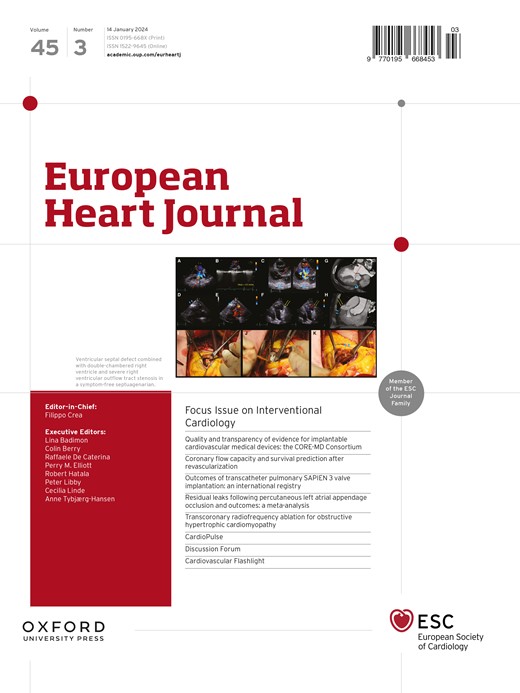糖尿病患者尿路感染和钠-葡萄糖共转运蛋白-2抑制剂的持续应用。
IF 35.6
1区 医学
Q1 CARDIAC & CARDIOVASCULAR SYSTEMS
引用次数: 0
摘要
背景与目的:研究尿路感染(UTI)和随后停用钠-葡萄糖共转运蛋白-2 (SGLT2)抑制剂对2型糖尿病(T2DM)患者临床结局的影响。方法:这项区域性队列研究分析了2015年1月至2022年6月期间服用SGLT2抑制剂的T2DM患者。主要结局包括主要心血管综合结局(心力衰竭住院、中风、心肌梗死或全因死亡率)和主要肾脏综合结局(肾小球滤过率[eGFR]估计下降50%、终末期肾衰竭或全因死亡率)。次要结果为复发性尿路感染。目标试验模拟应用于估计停用SGLT2抑制剂的影响。结果6606例符合条件的患者中,3921例(6.36%)在随访期间至少发生一次尿路感染。与没有UTI的患者相比,发生UTI的患者表现出更高的主要心血管复合结局[危险比(HR): 3.18, 95%可信区间(CI): 2.88-3.51]和主要肾脏复合结局(HR: 2.51, 95% CI: 2.32-2.72)。尿路感染后,32.31%的患者停用SGLT2抑制剂。与继续使用相比,停药与更高的心血管(HR: 1.35, 95% CI: 1.20-1.53)和肾脏(HR: 1.35, 95% CI: 1.21-1.51)风险相关,而尿路感染复发的风险相似(HR: 0.96, 95% CI: 0.22-4.29)。结论:在服用SGLT2抑制剂的T2DM患者中,新发UTI与心血管和肾脏事件风险增加相关。尿路感染后停用SGLT2抑制剂与心血管和肾脏预后的高风险相关,但与复发性尿路感染的减少无关。本文章由计算机程序翻译,如有差异,请以英文原文为准。
Urinary tract infection and continuation of sodium-glucose cotransporter-2 inhibitors in diabetic patients.
BACKGROUND AND AIMS
To investigate the impact of incident urinary tract infection (UTI) and subsequent sodium-glucose cotransporter-2 (SGLT2) inhibitors discontinuation on clinical outcomes among patients with type 2 diabetes mellitus (T2DM) prescribed SGLT2 inhibitors.
METHODS
This territory-wide cohort study analysed patients with T2DM prescribed SGLT2 inhibitors from January 2015 to June 2022. Primary outcomes included primary cardiovascular composite outcomes (heart failure hospitalization, stroke, myocardial infarction, or all-cause mortality) and primary renal composite outcomes (50% decline in estimated glomerular filtration rate [eGFR], end-stage renal failure, or all-cause mortality). The secondary outcome was recurrent UTI. A target trial emulation was applied to estimate the impact of discontinuing SGLT2 inhibitors.
RESULTS
Among 61 606 eligible patients, 3921 (6.36%) had at least one UTI incidence during follow-up. Patients with incident UTI exhibited a higher risk of primary cardiovascular composite outcomes [hazards ratio (HR): 3.18, 95% confidence interval (CI): 2.88-3.51] and primary renal composite outcomes (HR: 2.51, 95% CI: 2.32-2.72) compared to those without UTI. Following a UTI, 32.31% of patients discontinued SGLT2 inhibitors. Discontinuation was associated with a higher cardiovascular (HR: 1.35, 95% CI: 1.20-1.53) and renal (HR: 1.35, 95% CI: 1.21-1.51) risks compared to continued use, while the risk of recurrent UTI was similar (HR: 0.96, 95% CI: 0.22-4.29).
CONCLUSIONS
New-onset UTI was associated with an increased risk of cardiovascular and renal events in patients with T2DM prescribed SGLT2 inhibitors. Discontinuing SGLT2 inhibitors after a UTI was linked to a higher risk of cardiovascular and renal outcomes but was not associated with fewer recurrent UTI.
求助全文
通过发布文献求助,成功后即可免费获取论文全文。
去求助
来源期刊

European Heart Journal
医学-心血管系统
CiteScore
39.30
自引率
6.90%
发文量
3942
审稿时长
1 months
期刊介绍:
The European Heart Journal is a renowned international journal that focuses on cardiovascular medicine. It is published weekly and is the official journal of the European Society of Cardiology. This peer-reviewed journal is committed to publishing high-quality clinical and scientific material pertaining to all aspects of cardiovascular medicine. It covers a diverse range of topics including research findings, technical evaluations, and reviews. Moreover, the journal serves as a platform for the exchange of information and discussions on various aspects of cardiovascular medicine, including educational matters.
In addition to original papers on cardiovascular medicine and surgery, the European Heart Journal also presents reviews, clinical perspectives, ESC Guidelines, and editorial articles that highlight recent advancements in cardiology. Additionally, the journal actively encourages readers to share their thoughts and opinions through correspondence.
 求助内容:
求助内容: 应助结果提醒方式:
应助结果提醒方式:


